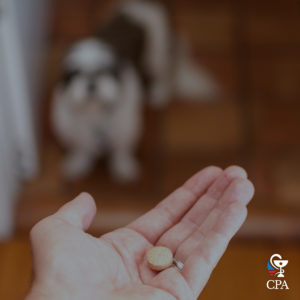
Just like supplements and vitamins intended for human consumption, some animals may benefit from taking these substances on a regular basis, but others may experience negative effects from certain vitamins and supplements.
So, do pets need supplements? In most cases, the answer is no. Thanks to the methods commercial pet food companies use to produce their products, most household pets in America receive all of the vitamins and minerals they need from high-quality commercial food.
Unlike humans who eat varied diets that typically change on a regular basis, most pets eat the same food every day. If a person neglects to eat foods with specific nutrients, he or she may benefit from taking supplements or specific vitamins to help make up for these deficiencies.
Commercial pet food manufacturers have taken pets’ more consistent eating habits into account to produce foods that meet pets’ daily requirements for various vitamins and minerals.
Do Pets Need Vitamins or Supplements: Considerations for Your Dog or Cat
While pets eat consistent diets and generally do not require special pet vitamins or pet supplements, some dogs and cats may have individual health issues that require adjustments to their typical diet.
The best way to determine whether a pet needs anything beyond its usual diet is to ask your veterinarian. You can easily research the best nutritional guidelines for your dog’s size and breed, but your veterinarian can help identify an individual pet’s genetic abnormalities or other health conditions that may require special attention.
Commercial Dog Food Formulas
When shopping for commercial pet food, make sure you purchase a brand and variety that works for your pet’s size, weight and breed. For example, puppies and some smaller dogs do not have strong enough teeth to chew through dog foods designed for larger, older dogs. Some dogs with tooth issues or missing teeth may require wet food.
Once you determine the type of food your pet requires, check the nutritional information to make sure it meets your pet’s basic requirements. There are also different food types for the different stages of life for a pet. For example, you’ll likely notice specialized formulas for puppies, mature dogs and senior dogs.
If you’re not sure what brand or type of food would be best for your pet, ask your veterinarian for recommendations.
Pet Vitamins and Supplements that May Help Them
Once you know the nutritional breakdown of your pet’s food and your pet’s daily requirements, take time to consult your veterinarian about any special dietary considerations. For example, a dog with a liver condition may require special vitamins to boost this organ’s function.
If your dog suffers from psoriasis or another skin condition, supplements that encourage healthy skin and hair may help your dog be more comfortable and prevent scratching. A senior dog might benefit from vitamins that boost cognitive function or help sharpen vision.
Pet Supplement Efficacy Statistics

Many dog owners give their dogs probiotics to help with intestinal issues, as well as multivitamins that encourage a healthy, shiny coat along with arthritic join support.
A 2007 study in The Veterinary Journal concluded that glucosamine-chondroitin sulfate supplements could help dogs suffering from osteoarthritis. Dogs observed in the study displayed fewer signs of pain and increased motor function within 70 days of beginning treatment.
If you consult your veterinarian and develop a nutritional plan that includes any supplements or additional vitamins, you also need to verify the validity of any supplement manufacturer’s claims. The National Animal Supplement Council reviewed its members’ arthritic joint assistance supplements and reported that about 25 percent did not meet claims made on their labels.
Meanwhile, a ConsumerLab.com study of three probiotic digestive supplements concluded that only one of the tested supplements actually met the active ingredient count listed on the label.
Do Careful Research for Your Pet
If you plan to add any nutritional supplements or vitamins to your pet’s diet, it is essential to carefully research the brands and varieties available. Make sure the brand you purchase has a solid track record of testing and third-party reviews. This lets you know if the product meets the claim on the label.
You should also check with your veterinarian about potentially harmful interactions between your pet’s foods, supplements and medications (if any).
Choosing the Right Vitamins and Supplements For Your Pet
Some fruit and botanical extracts can improve urinary function and help prevent urinary tract infections. Older dogs may benefit from vitamin C and E supplements that safeguard brain function and help repair and protect brain cells. Glucosamine-chondroitin supplements can reduce the symptoms of osteoarthritis. Fatty acids are great for your pet’s coat, and fish oil supplements can help reduce inflammation.
Finding the right balance between the nutrition in your pet’s food and your pet’s individual health concern(s) can be challenging. It’s possible your pet may require medications in addition to nutritional supplements.
Pet owners often find it difficult to administer some medications to their pets, while others may struggle to find a brand of food that meets basic nutritional requirements without aggravating a pet’s individual medical issues.
Custom Medication Options
The Compounding Pharmacy of America offers custom prescription medications. Some patients can’t find the right dose of a necessary medication, while others may struggle to find a replacement for a prescription no longer on the market.
Other patients may have the right medication and dosage, but have difficulty swallowing a pill or using another delivery method. Our compounding services allow these patients to fill their prescriptions in unique ways that meet their individual needs.
How Can Compounded Medication Help My Pet?
If your pet has a genetic disorder, chronic medical condition or is experiencing the effects of aging, you should consult your veterinarian about the types of medications and supplements that could help.
Contact The Compounding Pharmacy of America if you need a custom medication for your pet. For example, the supplement your pet needs may typically come in a pill form, but if your dog has tooth or chewing problems, a pill may not work for you. Instead, our compounding pharmacy can craft a powder or liquid-based medication that you can mix into wet food for your pet.
The Compounding Pharmacy of America can help with picky pets as well as pets that require carefully dosed nutritional support and medications. Contact us to learn more about our veterinary services and to start exploring the ways you can customize your pet’s medications and supplements.
See All Veterinary Compounding Services
Chief Operating Officer, The Compounding Pharmacy of America
Matthew Poteet, Pharm.D. graduated with Honors from Lee University with a Bachelors of Science in Biological Science. After his undergraduate training, he completed the Doctor of Pharmacy program at Mercer University Southern School of Pharmacy, graduating in 2004. Dr. Poteet has spent much of his pharmacy career on staff at two of the most prestigious academic teaching hospitals in the Southeast; Emory University in Atlanta and Vanderbilt University Medical Center in Nashville. At these institutions he received extensive experience and training in sterile products compounding.
He returned home to East Tennessee in 2010, where he has held the position of Pharmacy Director at two sterile products pharmacies in Knoxville. Matthew lives in Knoxville with his wife, Chris. Dr. Poteet is Tennessee’s first Board Certified Anti-Aging Pharmacist by the American Academy of Anti-Aging Medicine.

 Subscribe to Our Newsletter
Subscribe to Our Newsletter


